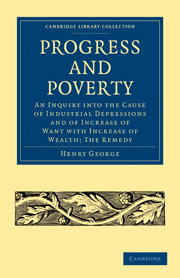 Progress and Poverty
Progress and Poverty Book contents
- Frontmatter
- PREFACE TO FOURTH EDITION
- Contents
- INTRODUCTORY
- BOOK I WAGES AND CAPITAL
- BOOK II POPULATION AND SUBSISTENCE
- BOOK III THE LAWS OF DISTRIBUTION
- BOOK IV EFFECT OF MATERIAL PROGRESS UPON THE DISTRIBUTION OF WEALTH
- BOOK V THE PROBLEM SOLVED
- BOOK VI THE REMEDY
- BOOK VII JUSTICE OF THE REMEDY
- BOOK VIII APPLICATION OF THE REMEDY
- Chapter I Private property in land inconsistent with the best use of land
- Chapter II How equal rights to the land may be asserted and secured
- Chapter III The proposition tried by the canons of taxation
- Chapter IV Indorsements and objections
- BOOK IX EFFECTS OF THE REMEDY
- BOOK X THE LAW OF HUMAN PROGRESS
- CONCLUSION
- INDEX
Chapter III - The proposition tried by the canons of taxation
Published online by Cambridge University Press: 07 September 2011
- Frontmatter
- PREFACE TO FOURTH EDITION
- Contents
- INTRODUCTORY
- BOOK I WAGES AND CAPITAL
- BOOK II POPULATION AND SUBSISTENCE
- BOOK III THE LAWS OF DISTRIBUTION
- BOOK IV EFFECT OF MATERIAL PROGRESS UPON THE DISTRIBUTION OF WEALTH
- BOOK V THE PROBLEM SOLVED
- BOOK VI THE REMEDY
- BOOK VII JUSTICE OF THE REMEDY
- BOOK VIII APPLICATION OF THE REMEDY
- Chapter I Private property in land inconsistent with the best use of land
- Chapter II How equal rights to the land may be asserted and secured
- Chapter III The proposition tried by the canons of taxation
- Chapter IV Indorsements and objections
- BOOK IX EFFECTS OF THE REMEDY
- BOOK X THE LAW OF HUMAN PROGRESS
- CONCLUSION
- INDEX
Summary
The best tax by which public revenues can be raised is evidently that which will closest conform to the following conditions:
1. That it bear as lightly as possible upon production—so as least to check the increase of the general fund from which taxes must be paid and the community maintained.
2. That it be easily and cheaply collected, and fall as directly as may be upon the ultimate payers—so as to take from the people as little as possible in addition to what it yields the government.
3. That it be certain—so as to give the least opportunity for tyranny or corruption on the part of officials, and the least temptation to law-breaking and evasion on the part of the taxpayers.
4. That it bear equally—so as to give no citizen an advantage or put any at a disadvantage, as compared with others.
Let us consider what form of taxation best accords with these conditions. Whatever it be, that evidently will be the best mode in which the public revenues can be raised.
I.—The Effect of Taxes upon Production.
All taxes must evidently come from the produce of land and labor, since there is no other source of wealth than the union of human exertion with the material and forces of nature. But the manner in which equal amounts of taxation may be imposed may very differently affect the production of wealth.
- Type
- Chapter
- Information
- Progress and PovertyAn Inquiry into the Cause of Industrial Depressions and of Increase of Want with Increase of Wealth; The Remedy, pp. 367 - 378Publisher: Cambridge University PressPrint publication year: 2009First published in: 1881


